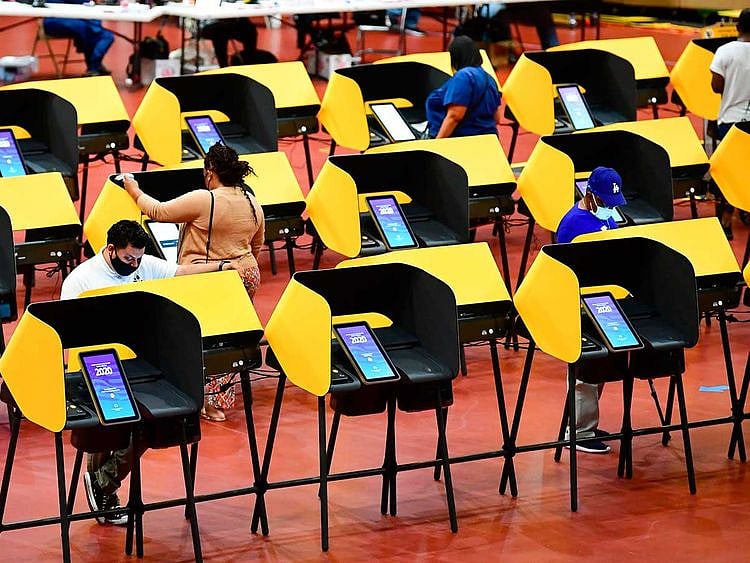When will we know the US election 2020 results?
Mail ballots and different approaches in states could delay final results

Washington: There’s a good chance Americans won’t know the winner of Tuesday’s presidential election when they go to bed that night.
The main reason? Many states have made it easier to request a mail ballot amid the coronavirus pandemic and concerns about crowded polling places. But mail ballots generally require more time to process than ballots that are cast in person.
DIFFERENT STATES, DIFFERENT APPROACHES
Some states with extensive experience in using mail-in ballots have adjusted for those extra steps.
In Florida, clerks can start counting ballots 22 days before an election. In North Carolina, beginning five weeks before the election, county boards insert approved ballots into a voting machine, allowing for a prompt tabulation on Election Day.
But other states such as Michigan, Pennsylvania and Wisconsin, all with Republican-led legislatures and all of them swing states, made a conscious decision to wait. There will be no counting of mail-in ballots prior to Election Day, As a result, it could take days to tally enough ballots to project a winner.
The wrangling in the states over the use of mail-in ballots has come as President Donald Trump claims that mail voting is ripe for fraud.
Numbers start to come in after in-person voting closes at 6:00 pm Eastern Time (EST) (2300 GMT) in parts of two states, and then build as more states stop allowing votes in the hours after.
Most close by 9:00 pm EST, opening the way for a gusher of vote tallies over the following hours, with some districts and states reporting faster than others.
Several, including California, the largest, only close at 11:00 pm EST, and Hawaii and Alaska, small voter-wise, vote until midnight and 1:00 am EST, respectively.
STATES TO WATCH
Given that opinion polls already indicate clearly which way 38 of the 50 states will go, the focus is on 12 key states.
The first ones to watch are the eastern states of Georgia, where polls close at 7:00 pm; Florida, where, depending on the district, polls shut at 7:00 pm or 8:00 pm; North Carolina where polls close at 7:30 pm; and the western state of Arizona at 8:00 pm EST.
Based on projections for the "decided" states, it is possible that if Biden captures Florida and two of the above others, he could be judged the overall winner of more than 270 electoral college votes early in the night.
But, using projections, even if Trump wins all of the above four, the overall victor would still be unclear.
ELECTION DAY ISN’T ALWAYS THE DEADLINE
And here’s another wrinkle that could delay the naming of a winner: In some key states, mail-in ballots can come in several days after Election Day and still be counted, as long as they are postmarked by then. Democrats have argued that the flood of absentee ballots and slow mail delivery in some areas makes such a precaution necessary.
For example, mail-in ballots from Nevada voters are not due until Nov. 10 if postmarked by Election Day. In North Carolina, mail-in ballots are not due until Nov. 12 if postmarked by Election Day.
HOW IS THE WINNER DECIDED?
Officially, the winner of the White House is not decided until every state has certified its vote count which, given delays for mailed-in ballots, could be a week or more in some places.
But the race is typically "called" by major news organizations on election night, based on their tabulations of reported totals, district by district.
They make a decision on the winner of each state, and finally the entire election, when it appears there is no mathematical way for one candidate to overcome his deficit and the other has a sure path to the magic number of 270 electors.
Ronald Reagan's 1980 landslide victory was called at 8:15 pm EST on election Tuesday (1:15 am GMT Wednesday).
But in 2016, Trump's victory over Hillary Clinton only became clear at about 1:30 am EST Wednesday when tallies showed he had won Pennsylvania. Still, Clinton only conceded an hour later after Wisconsin fell to Trump.
And in 2000, the election came down to who won Florida, where the candidates were divided by a few hundred votes. The two parties battled for weeks legally until the Supreme Court weighed in and halted recounts, handing the election to George W. Bush.
THERE WILL BE LEGAL CHALLENGES
Polling indicates that a majority of Trump’s supporters plan to cast their ballot on Election Day, while more than half of Joe Biden’s backers plan to vote by mail. Expect the Trump campaign’s legal team to challenge the validity of many mail-in ballots cast in critical battleground states such as Pennsylvania and Wisconsin.
“We will have a sizable contingent of lawyers who will be ready to fend off any of the shenanigans that Democrats are trying,” Tim Murtaugh, the Trump campaign’s communications director, told reporters this week.
SOME EARLY SIGNS?
Sign up for the Daily Briefing
Get the latest news and updates straight to your inbox
Network Links
GN StoreDownload our app
© Al Nisr Publishing LLC 2026. All rights reserved.